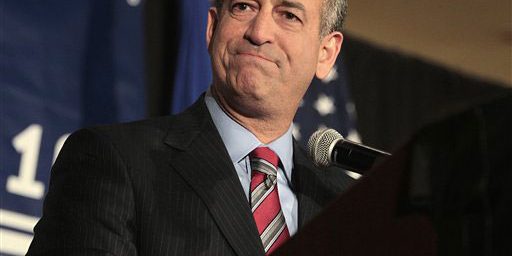1600 PAGES OF CONFUSION
George Will discusses the problems of trying to distinguish between political advocacy and free speech, as the authors of McCain-Feingold have endeavored to accomplish:
Under that law, after ads have run and their legality has been challenged, the Federal Election Commission shall brood about their intent. But would not fear of an adverse ruling from the FEC’s speech police have a chilling effect on political advocacy?
No problem, according to Judge Richard Leon, who complacently suggests: Do you find the McCain-Feingold speech rules vague and confusing? There are two ways to be safe from criminal prosecution. Avoid mentioning a congressional candidate. Or seek an advisory opinion from the FEC about whether the speech you want to engage in is criminal.
Wayne LaPierre, executive vice president of the NRA, an organization whose speech some McCain-Feingold supporters specifically said they wanted to limit, says Leon’s advice amounts to: “Ask a government agency funded by Congress to tell you what you are permitted to say about members of Congress.” Leon says that as Congress knows so much more than courts do about issue ads, courts should defer to Congress about abridging the right to run them. So Congress will be the arbiter of when and how citizens are permitted to criticize members of Congress?
No problem, says Leon serenely, because “a person of ordinary intelligence can be expected to understand this test” — the test between legal and criminal political advocacy. But Leon and his two colleagues disagreed about the ads. Which of the judges do not have ordinary intelligence?
Heh.
And it’s crap like this that makes Megan view social science with skepticism:
Two professors had their students view ads and label them “genuine” issue advocacy ads or “shams” designed solely to influence elections. Rushing to publish a book in time to sway the votes on McCain-Feingold, the Brennan Center, unhappy that one group of students had labeled too many ads “genuine,” called the students’ professor, Kenneth Goldstein, on his cell phone — he was at an airport — and “after the text of each ad was read to him over the phone, Goldstein overruled the students’ judgments and reclassified each ad as an ‘electioneering’ ad.” This sham “social science” powerfully influenced the congressional vote on McCain-Feingold and is the foundation of two of the three judges’ opinions that much of McCain-Feingold is constitutional.
Not that this “study” would have been of any social scientific value whatsoever even without manipulation.
(Here is an older study co-authored by Prof. Goldstein, including some coding rules and a discussion of the “magic words test.”)






I thought of Megan as well when I read that. That is a clear manipulation that is unconscionable. Of course, we see things like that in hard science from time to time as well
—